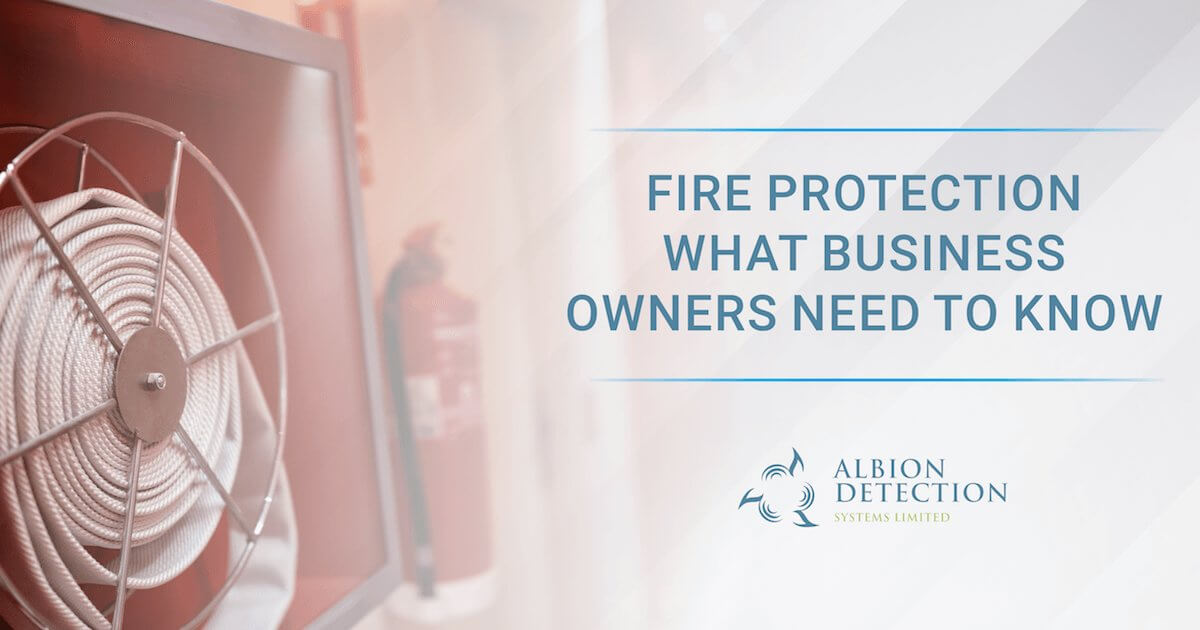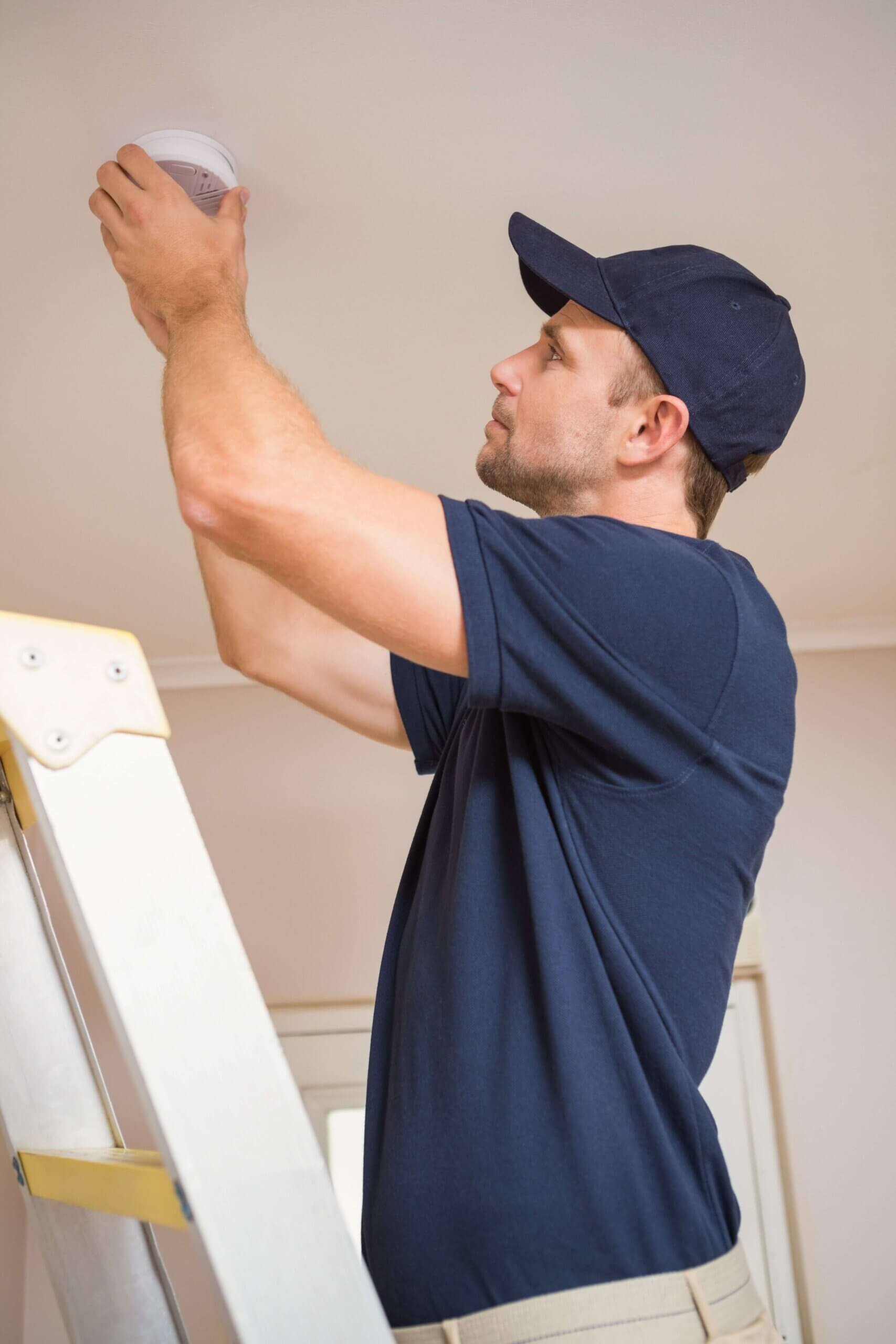
Fire Protection – What Business Owners Need To Know – Albion Detection Systems
Fire protection is one of the most important features of any commercial property, with a value which spans sectors and industries to take on truly monumental proportions in all your planning and strategising.
Start With A Fire Safety Focus
Without a great fire safety plan in place, you run the risk of not only damaging your building, risking lives and losing stock or assets but also of falling behind on the latest fire safety legislation.
The consequences of failing to adhere to fire safety law can be catastrophic for your company, leading to hefty fines, legal bills and prosecution, as well as adversely affecting your ability to get insurance.
With the right fire protection know-how, you can ensure your business is protected against both the risk of fire and the spectre of legal ramifications.
Installing a few key pieces of fire protection software, closely monitoring the unique needs of your building, regularly assessing your existing provisions and staying on top of training can all make a world of difference for your safety and peace of mind.
There are several key areas to keep in mind when considering fire protection for your company, spanning everything from tasks you can carry out yourself, to those better left to the professionals.
Fire Risk Assessment, What They Are & Why You Need One
Your fire risk assessment is critical for safeguarding your commercial property against fire damage, and helping to ensure everyone on the premises remains safe and secure in the event of a fire-related incident.
Risk assessments are the responsibility of each company, and failure to follow regulations by carrying out your assessment could lead to prosecution.
Risk assessments involve a thorough examination of the premises, as well as defining exactly what is at stake should a fire strike.
You are called upon to identify hazards and assign a responsible person to oversee and undertake the assessment, determining key risk factors inherent to your individual premises.
Fire risk factors will differ from company to company; where one might work with high-stakes flammable materials, another might be burdened with a less-than-practical business premises which pose a higher than usual fire risk.
The key conclusions of your assessment are in the ways you can minimise these risks, whatever they may be.
The Gov.uk website offers guidance on how to complete a thorough and effective fire risk assessment.
Each assessment needs regular reviews and updates for relevancy, and the materials you produce can not only keep the company safe from fire but be used in further training.
Fire Safety Regulations – It’s The Law
Fire safety regulations are currently dictated by The Regulatory Reform 2005, which seeks to explain the current legal stance on requirements for fire safety, whilst also providing a framework through which these standards can be met.
The rules are designed to protect staff and others who spend time on your business premises.
They work to safeguard your business assets and limit damage should you experience a fire.
Whilst all staff members should be trained in basic fire safety and your own fire drill and fire safety policies, your designated responsible person is mainly responsible for putting these plans into action and ensuring you remain within fire safety law.
They will be called upon to carry out your fire risk assessments and keep them updated, as well as monitoring and overseeing the testing and maintenance (including the initial installation) of your fire safety equipment.
Your responsible person will also be required to keep your fire safety log book updated with all relevant fire protection information.
This will include testing records, points of note and new measures which are being put into place.
Ensuring a stringent approach to fire safety helps to stay on top of regulation and avoid breaching fire safety legislation.
The Different Types Of Fire Protection Systems
There are many varieties of fire protection systems available, and each has their own unique benefits for different types of premises.
While one location may comply perfectly with fire safety regulation, simply by installing a few basic pieces of fire safety kit, others, mainly larger and multi-layered facilities, will need much more significant investments and sophisticated solutions.
Some of the primary fire protection systems available include methods such as:
- Fire Extinguishers
Fire extinguishers, which used to put out smaller blazes at first contact. These are available in varieties such as
- Water-based extinguishers (not suitable for electrical fires),
- Co2 extinguishers, and foam extinguishers, which work to break down the fuel which powers the burning liquid, effectively neutralising flames.
- Fire Alarm Systems
These are often a company’s go-to line of defence, detecting signs of smoke, changes in atmosphere and heat, before raising the alarm and allowing your emergency safety plan to be enacted.
Depending on the size and scale of your company, you may require numerous fire alarm points so those on the premises can notify others of an impending threat.
- Fire Sprinklers and Dampers
Provide an additional method for putting out a fire and limiting structural damage.
- Emergency Lighting
Can help to show the way to safety, and fire safety signs provide information on operating all this protection equipment safely and effectively.

Fire Safety Checklist Essentials
A fire safety checklist forms a key tool in the fight against your risk of fire.
As an important aspect of your company’s risk management, it provides a framework through which you can ensure you have all the right measures in place to limit fire damage and prevent fires from occurring in the first place.
Your checklist also ensures disruption to business is kept to a minimum, should your premises suffer fire damage.
Your fire safety and fire drill checklist should encompass a diverse range of areas, including:
- Basic cleanliness and tidiness of workstations
- Through the establishment of effective storage solutions away from sources of ignition
- A sensible policy on heating and lighting
- And the careful handling of flammable materials as applicable
The checklist even helps you to lock down the enforcement of your smoking policy and building maintenance, as well as outlining measures intended for damage limitation.
It should include your company’s
- Fire drill procedure
- Escape procedure
The fire drill checklist should ensure that personal safety is paramount throughout.
As a helpful reminder of all the areas you need to stay in control of whilst compiling your fire safety records, there is no document more important for providing those little prompts which could help to ensure a safer and more sustainable fire safety procedure is in place.
Maintenance Of Fire Protection Systems
Fire protection maintenance needn’t be complicated.
Basic maintenance checks can be carried out by fire safety trained personnel and will involve simple activities such as
- Checking smoke and fire alarms
- Ensuring all fire escapes are clear of obstruction
- Checking fire doors are securely closed
Your weekly fire protection systems checks should be more thorough, including checking firefighting equipment for signs of tampering, failure and logging any findings.
Monthly, your checks will be significantly more in-depth and may require formal maintenance or supervision.
Every six months, you are required by law to have your fire alarms serviced professionally, and once a year your sprinkler system and emergency lighting must be tested.
These checks are not generally carried out with more frequency due to their tendency to interrupt working conditions.
Some firefighting equipment, such as fire extinguishers, can degrade over time even when not in use, so ensuring your maintenance is carried out by a competent person or a trained maintenance body is crucial.
This will not only guarantee that your business remains compliant with fire safety regulations, it also has the more practical advantage of maintaining all your firefighting kit in top working order.
Essential Fire Protection Accreditations
All businesses, contractors and other decision-makers must ensure they are aware of fire protection accreditation when selecting a fire alarm supplier and equipment relating to fire safety.
There are many fire safety standards, which are widely available via the accreditation portal BAFE. An independent register which lists the best-accredited fire protection and fire safety installers.
For those seeking to stay on the right side of the law, this is essential.
As UK legislation favours the usage of accredited companies as a key facet of adherence to fire safety law.
There are several different accreditations and standards, which are verified and dispensed via the UKAS (United Kingdom Accreditation Service).
These are promoted by industry bodies such as the independent Fire Safety Association, which seeks to continually improve accreditation opportunities and training for ever greater levels of fire safety in commercial buildings.
Accreditation demonstrates expertise in areas such as
- System Design,
- Installation,
- Commissioning
- Servicing & Maintenance
It also minimises false alarms and helping provide critical peace of mind by getting installations right.
By choosing an accredited installer, you can be sure your company is not only staying within the law but also in the best possible shape
It is second nature to help safeguard those in the property and all your assets should the worst happen.
Installation Expertise In Fire Protection Systems
Installing your fire protection system requires considerable expertise and experience, particularly in larger buildings or those in high-risk industries.
The level of complexity required when installing fire protection in some commercial premises is very different to that faced in residential properties.
Commercial fire protection systems must consider many more variables.
Often a bespoke fire protection system will be needed, mapped against your premises’ layout, operations and building type.
The systems you select will be dependent upon the size of your commercial premises, the number of floors, and the possibility for high-risk zones, all of which require monitoring with the latest fire alarms or smoke detection equipment.
There may be areas which necessitate more fire extinguishers, a sprinkler system or particularly durable emergency lighting.
Your chosen fire system installer should possess industry accreditations and be able to guide you through the process of your installation with limited disruption to your business.
Prior to installation, you are advised to gather together as much information as possible. You can glean this from your risk assessment and recommendations, to ensure a smooth update of your existing measures and optimum success of the measures you select.
All installations must comply with the latest fire safety regulations and legislation and a maintenance schedule drawn up and adhered to.

Responsibilities Of Owners Fire Protection
Business and property owners need to be aware of their distinct responsibilities when it comes to protecting their premises from a fire.
Whilst fire safety is everyone’s concern, the legal responsibility should something go wrong do not fall to the entire workforce.
Owners, therefore, need to be aware and vigilant.
Taking a proactive approach, which prioritises educating their staff, installing the latest equipment and ensuring they remain up-to-date with current fire safety legislation and system maintenance.
Keeping the occupants of your building safe through careful management of your fire protection responsibilities could help not only to save lives in the event of a fire but save you and your company significant legal fees and loss of earnings.
These responsibilities include carrying out regular fire risk assessments and carefully recording your findings for continual improvement.
You will also be expected to understand how to remove or reduce risks and ensure all fire safety equipment undergoes regular maintenance at the scheduled times.
Your responsibilities in this area are paramount to ensure a healthy workplace and legal compliance.
Fire Safety Negligence vs. Naivety – What You Need To Know
UK fire safety law is not as complicated as you might imagine.
However, it requires, for the most part, the application of common sense, regular checks, the right installations and maintenance.
There are always those who seek to avoid the law by negligently ignoring their obligations to fit the right fire safety equipment, hoping they will somehow avoid detection.
Alongside this intentional negligence, there are much more who accidentally fail to meet the requirements of UK fire safety law, resulting in legal action, penalties and even (in some cases) imprisonment.
These consequences can have a devastating effect on a business and its staff,
If negligence or naivety is not discovered until a fire has already occurred, then failure to pursue due diligence by complying with the law can have fatal consequences, too.
Business fire safety regulations exist to help make life easier for business owners and crucially, to help protect the lives of everyone on-site in the event of a fire.
Understanding how to stay within the law is therefore critical to your fire protection measures, and one of the most important aspects of your fire protection strategy.
Ready To Get Started
To get the inside track on where to start, download the checklist below or contact us to find out more, or book your free no obligation Fire Protection Consultation



